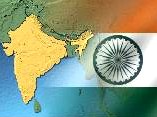


All You Need to
Know About INDIA
Government
Politics
Administrative divisions
Geography
Economy
Demographics
Culture
Last updated on
Sunday, October 29, 2006 19:28
- Mac. Dream. MX
Since emerging as a unified nation-state, India has maintained cordial relationships with most nations. It took a lead in the 1950s in advocating the dissolution of European colonialism in Africa and Asia. During the Cold War, India tried to maintain its neutrality and was one of the founding members of the Non-Aligned Movement. After the Sino-Indian War and the Indo-Pakistani War of 1965, India's relationship with the Soviet Union warmed at the expense of ties with the United States and continued to remain so until the end of the Cold War. India has consistently refused to sign the CTBT and the NPT to maintain sovereignty over its nuclear program despite criticism and military sanctions. Recent overtures by the Indian government have strengthened India's relations with United States, China and Pakistan. In the economic sphere, India has close relationships with other developing nations of South America, Asia and Africa. In recent years, India has played an influential role in the SAARC. India has been a long time supporter of the United Nations, with over 55,000 Indian military and police personnel having served in 35 UN peace keeping operations over four continents. Since the 1990s, India has been considered an emerging power on the global stage, meaning it has increasing influence on international affairs.
Terms
of Service, Privacy
Policy, Contacts and Credits
© 2006 thanneer91. All rights reserved
Page tested with Internet Explorer and Mozilla Firefox
Best viewed at a resolution of 600 X 800
Any unauthourized duplication of this site is strictly prohibited and liable
to prosecution
Timeline of Indian History ~~ Military History of India ~~ Indian Independance Movement